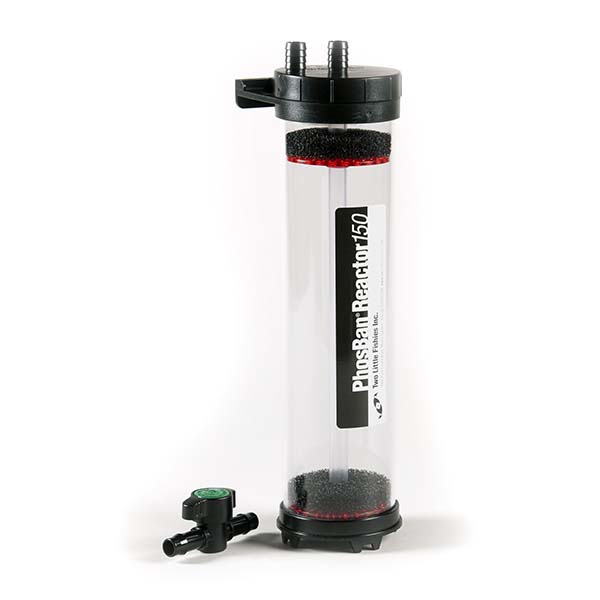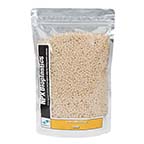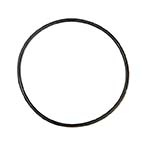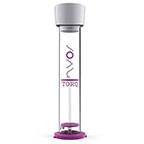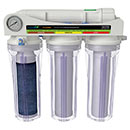Overview
| * | Aquarium filter media reactor for enhanced chemical filtration |
| * | Up-flow principle maximizes efficient use of chemical filter media |
| * | Optimize chemical filtration to improve aquarium water quality |
Maximize efficient use of chemical filter media for superior aquarium water quality. The Two Little Fishies PhosBan Reactor 150, designed with the up-flow principle, pushes water from the bottom upward through a dispersion plate to gently fluidize chemical filter media. Even distribution of aquarium water through the PhosBan Reactor prevents channeling and increases media contact with aquarium water for optimized use of PhosBan phosphate adsorption media, activated carbon and other chemical filter media.
Two Little Fishies PhosBan Reactor 150 includes barbed hose connections for 1/2" ID tubing and ball valve to fine tune flow rate. Appropriate size pump*, tubing, and media required (not included). Multiple reactors may be used for larger aquariums.
| Specifications | ||||
| Reactor Model | Media Capacity | Operating Flow Rate | Aquarium Size | Dimensions |
| 150 | 200 grams | 20-30 gph | 150 gallons | 4-1/2" x 4" x 17-1/2" high |
*The pump should have 100-200 gph (380-760 l/hr) capacity, although the flow must be reduced using the supplied ball valve
PhosBan Reactor 150
Important Notes: Do not use a media bag in the PhosBan Reactor. Simply place PhosBan or other media inside it according to the instructions. Don't over or under fill the column. Max 5 in (13 cm) of media, min 2 in (5 cm). When using only activated carbon, the entire column can be filled. PhosBan may be mixed with phosphate-free activated carbon. This can provide the necessary media volume when less than 100 grams (190 ml) of PhosBan is used. Do not place ball valve on the exit pipe. Restricting the flow on the exit pipe pressurizes the reactor and can cause leaks.
Description
The PhosBan Reactor 150 is designed with the upflow principle to achieve the most efficient use of PhosBan or other chemical filter media. By pushing water from the bottom upward through a dispersion plate, it forces an even distribution of water through the media. One reactor is for aquariums up to 150 gallons. Multiple reactors may be used for larger aquariums.
Preparing the Reactor
Unpack the reactor. Open reactor lid by turning counter clockwise. Check parts list to confirm that all parts are present. The reactor is supplied with all the parts needed to operate it except for the hose and pump. The pump used can be a powerhead, such as a Maxi-Jet, or the supply of water can be tapped-off of a circulating pump already in use on the aquarium. The pump should have 100-200 gph (380-760 l/hr) capacity, although the flow must be reduced using the supplied ball valve.
If the center tubes are not already glued to the dispersion plates, insert the end of the 9 inch center tube into one dispersion plate until it stops, and slide one of the sponges onto the tube so that it rests on top of the dispersion plate. Insert this assembly into the reactor column. It may be necessary to use tongs or a yardstick to keep the lower sponge resting on top of the dispersion plate when you insert it into the reactor column. Add about 1 cup of water to the reactor. Use a yardstick or tongs to push out the large air bubbles trapped in the lower sponge.
1a. Adding PhosBan Media
Before adding PhosBan to the reactor, temporarily cover the top of the 9-inch center tube with a piece of tape. This will prevent PhosBan from entering the tube when you add it to the column. To minimize dust evolution, wet the PhosBan first. Use a large spoon or scoop to put the PhosBan into the reactor. After adding PhosBan to the reactor column, remove the tape from the center tube.
1b. Finishing the Reactor Assembly
Attach the remaining dispersion plate onto the top of center tube. Insert the remaining 2-inch length of rigid tube into the top of the dispersion plate (if not glued already). Slide the remaining sponge on top of the center tube above the dispersion plate. Press it down to be sure it is sitting flat all the way around the dispersion plate. Inside the top of the lid there is a flat plastic washer and on top of it an O-ring. Check to be sure that the O-ring is seated properly. With the reactor sitting upright, attach lid on top of the reactor body by inserting the center collar (located on the underside of the lid) over the top of the center tube. Rotate lid on the threads until it becomes stiff (hand-tighten) to seal and close the reactor. Do not over-tighten! The flat washer allows slippage and makes it easier to open the reactor. It is otherwise not necessary.
2. Locating the Reactor
The PhosBan reactor can be seated upright in the cabinet, in the filter sump, upright on the floor below the aquarium or hanging on the side or rear of an aquarium. For hanging installations, use threaded bolt provided in the base plate to level it against the aquarium wall. Wherever it is located, the reactor must be upright and level to operate properly. To prevent any risk of back siphoning, the outlet of the water return hose should not be located below the water line if the reactor is located below the level of the aquarium or below where the return line enters the aquarium or sump.
3. Connecting the Pump
Attach the ball valve to the soft 90 fitting on the input pipe (center-barbed connector on the lid). Connect a length of 1/2 inch ID hose from the pump output to the ball valve. Connect another length of hose to the barbed fitting that slides into the soft 90 fitting on the water output pipe (outer hose barb connector on the lid) to return water to the aquarium or sump. It is not necessary to use hose clamps to secure the hose connections on the supplied fittings because they are barbed. It may be necessary to use a hose clamp to secure the connection to the pump. Do not let the weight of the pump pull the hose since this can cause a leak at the soft 90 fitting.
4. Initial Operation and Adjustment
Once the lid is securely fastened, the reactor is level, all of the hoses are securely attached, and the pump is located in the aquarium or sump, direct the return hose into a bucket, open the ball valve, and connect the pump to the mains electricity. Allow water to fill the reactor for 2 to 3 seconds and then close the ball valve to stop the flow. Partially open the valve slowly to about 20 gph to purge air from the outflow pipe and allow the initial dusty 1/2 gallon of water to empty into the bucket. When the water runs clear, close the valve and reposition the return hose to feed water back to the aquarium. Adjust the flow with the ball valve so that the PhosBan granules are tumbling slightly at the surface. A section of clear water will be located above the granules.
5. Maintenance Instructions:
About once per week open the ball valve for a few seconds and then return it to the normal operating position. This will stir up the media briefly and prevent caking or channeling. When changing the PhosBan, first shut off the pump that sends water to the reactor and close the ball valve. Place reactor inside a bucket to catch any spilled water when you open it. If the return hose is located in the aquarium or a sump above the level where you are servicing the reactor, make sure that the outlet is not located below the water line in the tank. If it is, lift the outlet hose so that it cannot siphon water from the aquarium or sump. Separate the lid from the reactor (the hoses may be left in place). Pour the water from the reactor into the bucket. Remove the top dispersion plate and sponge. Take the reactor column over a trash bin and spill out the PhosBan media. Rinse the reactor sponges with a strong jet of water. Never use soap or detergents of any kind. Reassemble the reactor per the instructions and follow the initial operation and adjustment procedure.
6. Replacement Parts & Accessories
The sponges will periodically need to be replaced. For installing the PhosBan Reactor hanging on the back of an aquarium, or on the side of a filter sump use the PhosBan Reactor Extension Kit to provide a flexible and space-saving pipe connection.


